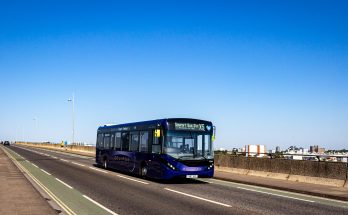Sadiq Khan unveils partners and goals for £1m Resilience Fund and launches £500k design-led recovery scheme.
The Mayor of London, Sadiq Khan, is today calling on the capital’s innovators to help drive forward the city’s recovery from the Covid-19 pandemic.
His £1 million Resilience Fund will support innovative businesses in tech and other sectors to respond to some of the key recovery challenges facing the capital – and it is now open to applications.
Sadiq Khan has today also revealed the partners which will work closely with his team to help applicants develop their ideas: Better Bankside and Kings College London; Ealing Council, Groundwork London, Lambeth Council, Hackney Wick and Fish Island Creative Enterprise Zone, Thrive LDN, Hackney Council, the Royal Docks Team, and the Living Wage Foundation.
Each partner – along with the Greater London Authority – is in charge of one of 10 challenges, which include diverting surplus food to community organisations helping those most in need, supporting highstreets, integrating the latest Covid-19 data and travel information for Londoners, and making workspaces more flexible, affordable and responsive to the changing needs of businesses as a result of the pandemic. Partners will also consider the challenges facing workers in the gig economy and design solutions to tackle the inequalities faced by those who have provided vital services over the last year.
The Fund, delivered in partnership with Nesta and funded by the London Economic Action Partnership (LEAP), will provide grants of up to £50,000 to develop solutions to help the city emerge stronger from Covid-19 – as well as ensuring it is more resilient to major challenges in the future.
The Mayor is also calling on public bodies, charities, businesses, social enterprises and educational institutions to take part in Designing London’s Recovery – a new initiative he is also launching today, which will harness the capital’s design talent to make a vital contribution to the capital’s recovery from Covid-19.
Delivered in partnership with the Design Council and the London Office for Technology and Innovation (LOTI) – and also funded by LEAP – Designing London’s Recovery will help organisations from a range of sectors work together to tackle the city’s most pressing challenges.
The initiative will focus on Londoners’ needs – particularly vulnerable residents and those hardest hit by coronavirus – to help the capital emerge as a healthier, fairer and more sustainable place to live and work. Previous Design Council projects have included addressing the issues of violence in A&E departments, responding to the challenges of an ageing society and transforming economies to better reflect 21st Century needs.
While the Mayor’s Resilience Fund has been designed to develop solutions put forward by innovative London businesses, organisations taking part in Designing London’s Recovery will co-create new solutions in partnership with the Design Council and LOTI.
Individuals and organisations will be asked to express their interest and successful applicants will receive a share of £500,000 as well as expert support from the Design Council to help them respond to three key challenges – further details of which will be revealed in the coming weeks.
“The challenges we face as a result of the Covid-19 pandemic affect every area of our lives and the economy. But I know our city is home to a wealth of innovation – and so I have no doubt that many of the solutions we need to drive our recovery will come from right here in the capital,” the Mayor of London, Sadiq Khan, said. “I’m doing all I can to support our creative businesses and organisations – so I’m calling on them to come forward with their ideas and take advantage of the funding and support on offer. This has been a very dark and difficult period for our city and I hope that these funds will bring together the capital’s talent and help build a more resilient city.”
“There are around 4.7 million workers in the gig economy and while many enjoy flexible working patterns, millions are trapped in low pay, with around 700,000 earning less than the minimum wage,” Director of the Living Wage Foundation, Laura Gardiner, said. “The pandemic has shown how essential their work is, and the importance of providing them with greater security. One of the biggest challenges is that nature of this work makes it hard for those in the gig economy to accurately gauge their take-home pay. By partnering with workers and innovators through the Resilience Fund, we hope to spur new tools that enable workers and employers to accurately gauge income and expenses on the gig economy platforms they use. This will allow a clearer picture on whether workers are earning the Living Wage, ultimately encouraging more gig employers to achieve this benchmark and so driving pay rises among low-paid gig economy workers.”
Full list of the London Resilience Fund challenges:
- Activating High Streets: solutions which use data to activate vacant properties on high streets and support London’s recovery from Covid-19 (in partnership with Ealing Councils’ High Streets Taskforce).
- Affordable Workspaces: solutions which help local businesses to access and occupy affordable new space (in partnership with Hackney Wick and Fish Island Creative Enterprise Zone).
- Air Quality: solutions which use data to help reduce vulnerable residents’ exposure to air pollution (in partnership with Lambeth Council).
- Bereavement Services: solutions to improve bereavement support services for communities disproportionately impacted by Covid-19 (in partnership with Thrive LDN).
- Covid-Safe Travel: solutions which leverage health and travel data to help increase confidence and enable a safe re-opening of London’s economy
- Gig Economy: solutions which use data and technology to help facilitate better pay and better work for gig economy workers (in partnership with the Living Wage Foundation).
- Local Food: solutions which tackle food insecurity across London’s communities (in partnership with Groundwork London).
- Public Markets: solutions to unleash the entrepreneurial spirit of London’s market traders and increase the resilience and diversity of London’s markets (in partnership with Hackney Council)
- Renewable Energy: solutions which use the water area for renewable energy production (in partnership with the Royal Docks Team).
- Smart Mobility: solutions to help organisations make freight journeys smarter and greener (in partnership with Better Bankside BID and King’s College London).
The Mayor’s Resilience Fund is now open for applications. For more information, see: https://tech.london/resilience
Designing London’s Recovery will open for applications on March 16. For more information, see: https://www.london.gov.uk/what-we-do/funding/designing-londons-recovery
For more information on the London Economic Action Partnership, see: http://lep.london.
Further information on the London Recovery Programme can be found here: https://www.london.gov.uk/sites/default/files/recovery_programme_overview.pdf
Further information on the Roadmap to the safe and full reopening of the London economy can be found here: https://www.london.gov.uk/publications/roadmap-safe-and-full-reopening-londons-economy-next-12-months

